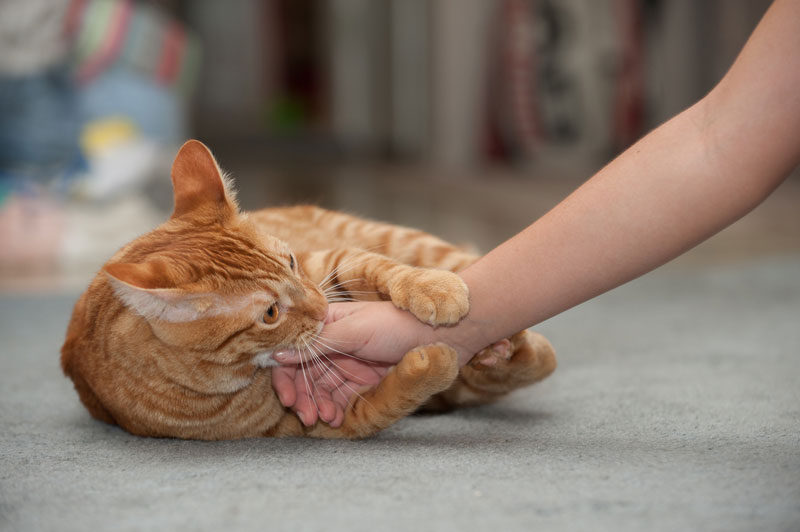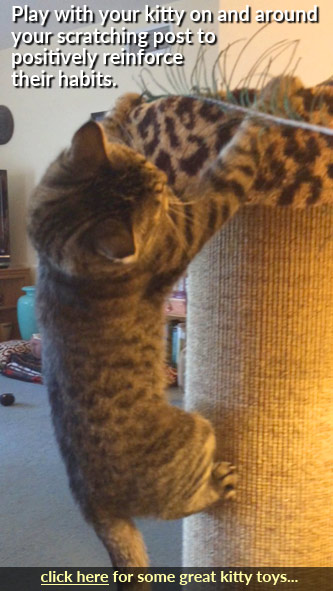- Home
- How to Stop a Cat from Biting When Playing
How to Stop a Cat from Biting When Playing

Does your kitten act loveable and sweet most of the time but turn into a piranha during playtime? Has your older cat had a hard time learning that biting humans during play isn't acceptable? Don't worry; it is possible to teach your cat to play without nipping your hands.
Why Do Cats Bite During Play?
It's important to understand why cats engage in play-biting behavior in the first place. Biting and bunny-kicking are normal play behaviors for kittens. This is how they play with their littermates and their mother. The play mimics how cats will later pounce on, grab, and bite prey.
When littermates are playing, they teach each other how to use their teeth gently, reigning in their bite. If a kitten bites a sibling too hard, that kitten will yowl and swat or bite back, then refuse to play with the other kitten for a period of time. Mother cat will also discipline a kitten for biting too hard.
Cats that are removed from their litters too soon may not learn to moderate their biting as well. But even if they do, the reigned-in bite that's acceptable to another cat is probably still too much for a human hand or foot. We must further instruct our cat that using his teeth on us at all is not acceptable.
How Can You Teach Your Cat to Keep His Teeth to Himself?
Here are some techniques to use that will help teach your cat that human skin is not for biting:
- Never use your hands or feet to wrestle with a cat that is being too aggressive with his teeth during playtime. Doing so only encourages escalation of the behavior. Similarly, don't use gloves with toys hanging from the fingers because it doesn't teach your cat not to bite hands. Still, your cat needs to exercise those hunter instincts and play hard to relieve stress and boredom and maintain good physical health. Always use a toy between your hands and your cat's mouth during play. Three types of toys work well.
- Wand toys are especially effective for interactive play with cats. You can control them from afar, without putting your hands within tooth-striking distance, and you can also make them move like a cat's prey, which is irresistible to a cat.
- Throw toys are also wonderful for keeping your body parts away from your cat's mouth during playtime.
- Kick toys can be given to your cat to allow him to get the biting and bunny-kicking out of his system. Long toys like these cigars or these body pillows work well for this purpose.
- Use withdrawal techniques if necessary. If you are playing with your cat and he does manage to bite a part of your body, firmly say "no," and then withdraw from the play session for a few moments. If every time your cat's teeth touch human flesh, playtime ends, your cat will quickly learn to stop biting.
- Never yell at or hit your cat for play biting. This behavior from you can cause your cat stress, which may result in a fearful cat, one that engages in unwanted stress-related behaviors like urinating outside of the litter box, or one that begins to show true aggression toward you and other residents of your home.
- Be ready to respond if your kitten pounces on your hands when you are doing something unrelated to play. Sometimes kittens or older cats find our hand movements irresistible while we are writing, typing on a keyboard, or doing other things. If your cat pounces on your hands during these times, firmly say "no," remove your hands, and throw an appropriate toy away from yourself. Praise your kitty when he runs after and attacks the toy.
- Don't pull away if you can help it. Although this is counterintuitive and will take some practice on your part, try not to pull your hand or foot away when your cat bites. This is similar to prey trying to get away, and it can trigger your cat to chase and attach even harder. Instead, try to push into your cat gently, which is not how prey acts. This should confuse your cat a bit and cause him to let go.
General Tips for Cat Training
Cats are quite trainable if you keep a few things in mind. Always use patience and be kind. Remember that you are asking your cat to do something that doesn't come naturally to him. Be sure to give lots of praise when your cat does what you want him to do. Simply reprimanding unwanted behavior without showing your cat what to do instead won't get you very far.
 Loading... Please wait...
Loading... Please wait...




